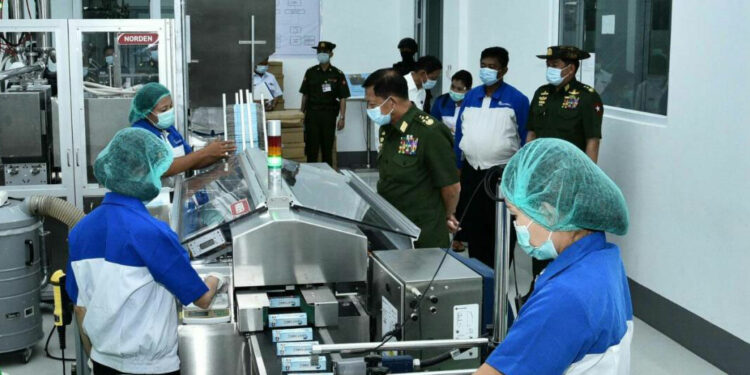Myanmar regime’s recent ban on importing soap, detergent and toothpaste has sparked allegations that it is trying to promote military-run businesses that have been boycotted since the coup.
The junta’s Ministry of Commerce banned the imports at border trade zones on Friday, saying the measures would protect Myanmar’s independent enterprises and reduce the use of foreign currency.
Imported shower gel, detergent, toothpaste and toothbrushes have dominated Myanmar’s markets due to their higher qualities and greater choice than domestic products.
The regime also banned imported instant coffee, soda and condensed milk from Thailand in April.
The regime leader Min Aung Hlaing has frequently tried to promote domestic products since the coup in an attempt to reduce foreign exchange spending on imports.
The ban came a few days after Min Aung Hlaing’s visit to the military-run Padonmar Soap Factory in Mon State last week. During the visit, he said the factory should strive to meet domestic soap demand and substitute imports, according to the state-run Global New Light of Myanmar. Despite the paper’s claim that the factory has been making numerous products since 2002, the brand has not previously been seen on sale.
A trader said the regime’s ban aimed to promote its products by “robbing from the dominant brands rather than being competitive”.
Ordinary people will suffer while those with connections would receive import licenses, he said.
“The prices will be manipulated. People who can afford it will have to use substandard products,” the trader said, requesting anonymity.
The military has been involved in the country’s economy through conglomerates like Myanma Economic Holdings Limited (MEHL) and the Myanmar Economic Corporation (MEC). The businesses span banking, brewing, bus services, mining, toothpaste, condensed milk and other everyday items. According to a 2019 United Nations fact-finding mission, revenue generated by military-owned companies “dwarf that of any civilian-owned company”.
The MEC opened a toothpaste factory in Yangon in 2019 making “Dentomec” using specialized machinery from Germany and Sweden. Min Aung Hlaing visited the factory in July last year, according to the Office of the Commander-in-Chief of the Defence Services website. But like Padonmar soap, Dentomec toothpaste and brushes are a rare sight in Myanmar.
Campaign group Justice for Myanmar (JFM) said the military operates throughout the economy, like a criminal cartel which must be dismantled.
On the import bans, the JFM said “it would come as no surprise that the military is now restricting trade in a desperate attempt to seek profits from its coup”.
Meanwhile, boycotts of military products continue.
Myanmar Lager Beer has been the product most heavily affected, which is made by Myanmar Brewery. The country’s largest beer maker saw its first-quarter sales plunge by almost 50 percent year on year in the first quarter of 2021, according to Japanese brewer Kirin, which is the military’s partner in the joint venture that owns the firm.
You may also like these stories:
Trying to Legitimize Myanmar’s Regime Can Only Backfire for China
Daw Aung San Suu Kyi’s Trial to be Completed Within Six Months
Myanmar Junta Hired Mon People to Join Coup Leader at Bridge Ceremony

















